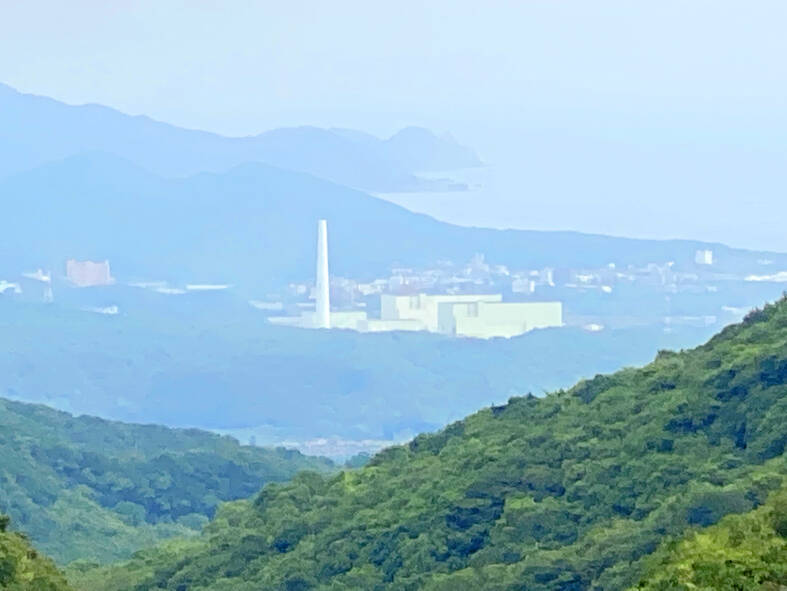Taiwan should not phase out nuclear energy, which is essential to the nation’s bid to boosting the share of renewable energy in its energy mix and achieving carbon neutrality by 2050, Taiwan People’s Party (TPP) Chairman and presidential candidate Ko Wen-je (柯文哲) said yesterday.
The Democratic Progressive Party has turned a blind eye to the global trend of moving toward net zero emissions and is instead clinging on to natural gas, itself a fossil fuel, which now makes up 50 percent of Taiwan’s energy mix, Ko said on a social media.
This problem can be remedied by greatly boosting the percentage of renewables among Taiwan’s energy sources and pushing back the time line to phase out nuclear energy, Ko said.

Photo: Tsai Yun-jung, Taipei Times
He recommended “extending the service life” of the Ma-anshan Nuclear Power Plant in Pingtung County’s Ma-anshan (馬鞍山), which is set to be fully decommissioned in May 2025, and that of the Guosheng Nuclear Power Plant in New Taipei City’s Wanli District (萬里), even though the plant was decommissioned in March.
He also called for security concerns surrounding the shuttered Fourth Nuclear Power Plant in New Taipei City’s Gongliao District (貢寮) to be addressed as soon as possible.
Following the 2011 Fukushima nuclear disaster, Taiwan that same year ordered a safety inspection of the Fourth Nuclear Power Plant.
The Ministry of Economic Affairs in July 2014 announced that the safety inspection report deemed the nuclear power plant to be “safe.”
However, the Atomic Energy Council (AEC) in August that year cited 23 “inconclusive” items and nine items that still require the submission of follow-up information by the state-run utility Taiwan Power Co.
The issues prevented the Fourth Nuclear Power Plant from receiving the permit for the use of fuel rods and led the AEC to declare that the plant had failed to meet safety standards on numerous occasions over the years.
In April 2014, then-premier Jiang Yi-huah (江宜樺) ordered that it be shuttered amid strong public opposition to its construction.
In 2021, a referendum on its unsealing and relaunching failed to pass after 3.8 million people voted for and 4.26 million voted against the proposal.
Ko recently proposed a goal to increase the share of renewable energy sources from the current level of 8 to 9 percent to 40 percent by 2030, but has yet to propose a detailed energy mix.
Achieving carbon neutrality by 2050 is a global trend, and many businesses have joined the RE100 initiative to achieve 100 percent renewable energy, Ko said.
Many Taiwanese businesses hope to jump on the bandwagon and have been trying to purchase renewable energy, only to be told that there is none available, he said.
This highlights Taiwan’s continual shortage of renewable energy, which has disadvantaged many companies, he said.
This has not only led to a large volume of carbon emissions, but also poses a risk to the nation’s energy supply due to fluctuating prices on a global level, Ko added.

Chinese Nationalist Party (KMT) Chairman Eric Chu (朱立倫), spokeswoman Yang Chih-yu (楊智伃) and Legislator Hsieh Lung-chieh (謝龍介) would be summoned by police for questioning for leading an illegal assembly on Thursday evening last week, Minister of the Interior Liu Shyh-fang (劉世芳) said today. The three KMT officials led an assembly outside the Taipei City Prosecutors’ Office, a restricted area where public assembly is not allowed, protesting the questioning of several KMT staff and searches of KMT headquarters and offices in a recall petition forgery case. Chu, Yang and Hsieh are all suspected of contravening the Assembly and Parade Act (集會遊行法) by holding

PRAISE: Japanese visitor Takashi Kubota said the Taiwanese temple architecture images showcased in the AI Art Gallery were the most impressive displays he saw Taiwan does not have an official pavilion at the World Expo in Osaka, Japan, because of its diplomatic predicament, but the government-backed Tech World pavilion is drawing interest with its unique recreations of works by Taiwanese artists. The pavilion features an artificial intelligence (AI)-based art gallery showcasing works of famous Taiwanese artists from the Japanese colonial period using innovative technologies. Among its main simulated displays are Eastern gouache paintings by Chen Chin (陳進), Lin Yu-shan (林玉山) and Kuo Hsueh-hu (郭雪湖), who were the three young Taiwanese painters selected for the East Asian Painting exhibition in 1927. Gouache is a water-based

Taiwan would welcome the return of Honduras as a diplomatic ally if its next president decides to make such a move, Minister of Foreign Affairs Lin Chia-lung (林佳龍) said yesterday. “Of course, we would welcome Honduras if they want to restore diplomatic ties with Taiwan after their elections,” Lin said at a meeting of the legislature’s Foreign Affairs and National Defense Committee, when asked to comment on statements made by two of the three Honduran presidential candidates during the presidential campaign in the Central American country. Taiwan is paying close attention to the region as a whole in the wake of a

OFF-TARGET: More than 30,000 participants were expected to take part in the Games next month, but only 6,550 foreign and 19,400 Taiwanese athletes have registered Taipei city councilors yesterday blasted the organizers of next month’s World Masters Games over sudden timetable and venue changes, which they said have caused thousands of participants to back out of the international sporting event, among other organizational issues. They also cited visa delays and political interference by China as reasons many foreign athletes are requesting refunds for the event, to be held from May 17 to 30. Jointly organized by the Taipei and New Taipei City governments, the games have been rocked by numerous controversies since preparations began in 2020. Taipei City Councilor Lin Yen-feng (林延鳳) said yesterday that new measures by